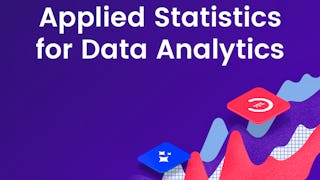Welcome to the Ball State University course “Statistical Methods for Data Science.” As the title suggests, this course provides fundamental concepts and methods for data-generating mechanisms such as probability models and inferential methods such as estimation and hypothesis testing. scientists. You will need the right tools and analytics methods to make good sense of data and to make data-driven decisions. We are going to take a systematic approach to build a strong foundation on probability and probability models, large sample theory as a bridge between probability theory and inference, and basic inferential processes. Please note that as data scientists, it is important for us to be able to connect data and learn how the world around us works. To accomplish this challenging task, we will learn how we can connect data through probability theory and statistical models and take actionable decisions, confirm a hypothesis, or make predictions.



Statistical Methods for Data Science


Instructors: Munni Begum
Access provided by L4G Solutions Private Limited
Skills you'll gain
Details to know

Add to your LinkedIn profile
3 assignments
See how employees at top companies are mastering in-demand skills

There are 2 modules in this course
Welcome! In part 1 of this module you will complete a recommended reading about the course and post on a discussion board entry to introduce yourself to your classmates. In part 2 of this module, we will review probability theory and its applications to real-world problem-solving. Probability is a measure of the chance of occurrence of a future event. For example, what is the probability that you will see two heads when you toss two coins? It is ¼, right? Why do you care about learning probability? Here is a quote by the ancient Greek philosopher Democritus “Everything existing in the universe is the fruit of chance”. Thus, it is important for us to have basic probability knowledge. In data science, probability helps us understand how data is generated and plays a major role in inference and prediction.In this module, we will review three definitions of probability, probability laws, conditional probability, and Bayes' rule. Knowledge of conditional probability is essential in most practical problems. Bayes' rule provides a mechanism for determining conditional probabilities when prior probabilities are given.
What's included
12 videos7 readings1 assignment1 peer review1 ungraded lab
In this module, we will talk about random variables which are basically a mapping or correspondence between the sample space of a random experiment and the real number system.
What's included
10 videos6 readings2 assignments1 ungraded lab
Build toward a degree
This course is part of the following degree program(s) offered by Ball State University. If you are admitted and enroll, your completed coursework may count toward your degree learning and your progress can transfer with you.¹
Offered by
Why people choose Coursera for their career




Explore more from Data Science

University of Leeds

Johns Hopkins University

DeepLearning.AI


